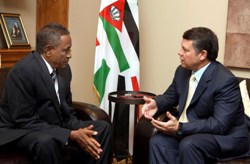Jordan monarch discusses ICC issue with Sudanese envoy
September 8, 2008 (AMMAN) — The Jordanian King Abdullah II on Monday received the Sudanese Justice Minister Abdel-Baset Sabdarat who delivered a message from Sudanese President Omer Hassan al-Bashir.

The ICC prosecutor Luis Moreno-Ocampo announced last July his intention to seek an arrest warrant for Al-Bashir on charges of genocide and war crimes.
The ICC judges have yet to make a decision which could take a few more months.
King Abdullah told the Sudanese official that Jordan is “keen on preserving the security and stability of Sudan as well as achieving national reconciliation and strengthening peace all over Sudan” PETRA reported.
Sabdarat expressed his government’s appreciation for the support received by Jordan to Sudan. He also that Khartoum wants to coordinate with Amman to find a resolution to its conflict with the ICC.
Jordan is one of three Arab states which are party to the ICC Statute which may explain why King Abdullah avoided making public comment criticizing the Hague based court.
Hypothetically Jordan has an obligation to enforce an ICC arrest warrant for Al-Bashir if he is present on its territory.
However Jordan supported the resolution issued by the Arab League foreign ministers last July criticizing the move by the ICC prosecutor.
Ironically the current Jordanian ambassador to Washington Prince Zeid Ra’ad Zeid Al-Hussein was the President of the ICC Assembly of States Parties from 2002-2005.
Sudan has not ratified the Rome Statute, but the UNSC triggered the provisions under the Statute that enables it to refer situations in non-State parties to the world court if it deems that it is a threat to international peace and security.
(ST)
